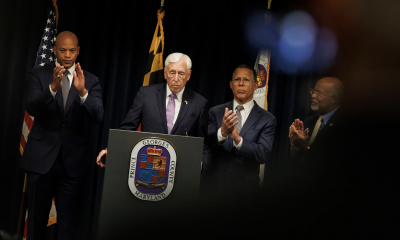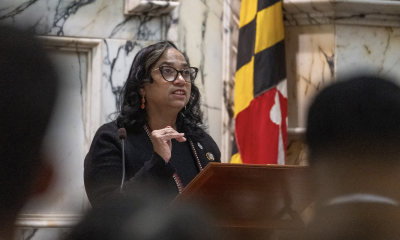Maryland
Moms for Liberty: A tale of two counties
In book ban fight, Maryland’s progressive Howard a stark contrast to neighboring Carroll
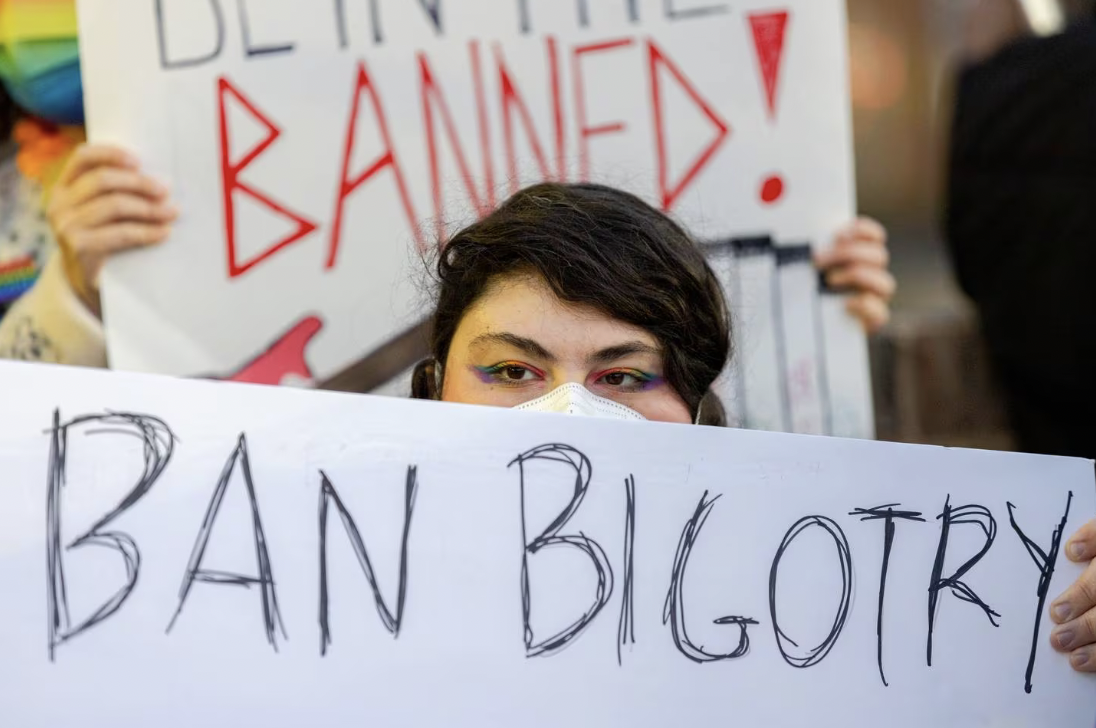
COLUMBIA, Md. — “I know there are children here,” said Jessica Garland, a little tremble to her voice. “This is my warning. There’s stuff that’s going to be said from these books. So if you want to remove your child, please do so now.” And with a deep breath, she continued. “He pushes against me, shoving the tip inside with a pop.” She paused for effect. The audience let out a few giggles and gasps of faux horror. Not a single parent removed their child from the room.
Garland was here in Howard County visiting from Carroll County, where as the chapter vice chair of Moms for Liberty, she had succeeded in pushing for the school board to ban “sexually explicit content” from school libraries. But her presentation here was attended by more mocker moms than soccer moms, fully clad in rainbow capes and Hawaiian necklaces, who had come to protest the event.
It is unlikely that the Howard chapter of Moms for Liberty will succeed in getting any books removed from schools, where none of the school board has signed the Moms for Liberty pledge to “secure parental rights at all levels of government.” The political makeup of Carroll and Howard counties is nothing alike: 60% of voters in Carroll voted for Trump in 2020, where only 26% in Howard did. Carroll County is an odd island of red in a sea of blue among the metropolitan counties of Maryland, with proximity to either Baltimore or D.C. It has a long history of right-wing proclivities, as a hotbed of KKK activity in the 20th century, and with only 59 of its 4,500 residents voting for Abraham Lincoln back in 1860.
Howard County, in contrast, seems like a queer paradise. The school system boasts a huge selection of LGBTQ programming, none of which can be found in Carroll schools: a biannual rainbow conference, LGBTQ book clubs for all age levels, Q&As for parents with queer kids, a queer literary magazine, and a Pride prom. But just because Moms for Liberty won’t succeed in replacing the school board doesn’t mean that they haven’t had any impact in Howard County.
At the Jan. 6 meeting of the school board, parents complained that their kids felt unsafe because of the recent political activity. And the school system has been pestered with numerous requests through the MPIA (Maryland Public Information Act) to report on the extent and funding of its LGBTQ programming. While the Howard County School System does employ a LGBTQIA+ Initiatives Specialist, Danielle DuPuis, they have not funded the many initiatives DuPuis has orchestrated since her hiring in 2022. DuPuis pays for the programming with fundraising through T-shirt sales, and with grants from organizations like Community Allies of Rainbow Youth. This lack of funding is a consequence of the school system’s tight budget, not of Moms for Liberty — but it is hard to imagine the school system diverting any of its limited funding to its LGBTQ programming with Moms for Liberty breathing down their neck.
This programming is important precisely because Howard County schools are not a queer paradise. On March 9, I attended one of Howard’s newer offerings: a Q&A for parents of queer students. The stories they told were shocking. Two parents described a Rainbow Fun Run that was held at Clarksville Middle School to raise money for queer youth. Students were encouraged to wear rainbow colored clothes for the event — but a dozen of the middle schoolers showed up in black from head to toe, wearing pins that said “There Are Only Two Genders.” It was refreshing to see the group react with humor. “Black is one of the colors of the rainbow,” one said. “You’re still participating anyway!”
Jessica insisted at the Moms for Liberty meeting that they were not trying to target LGBTQ books. “We did not target homosexuals, transsexuals [sic],” she said. It was clear the protesters in the audience did not believe her from the signs they carried: “Protect Trans Youth,” “Hate and Ignorance are Not Family Values,” “Ban Bigots Not Books.” They have good reason to distrust the intentions of Moms for Liberty. The Capital News Service conducted an analysis of the books Moms for Liberty targeted for removal in Carroll County, and concluded that a disproportionate number of those books were written by queer authors on queer subject matters.
But even if the quest to ban sexually explicit material from school libraries is in bad faith, the Moms for Liberty are right about one thing: The books they are targeting are sexually explicit. No protester at the event argued that the books weren’t sexually explicit, and yet no one defended the presence of sexually explicit books in schools, either. Perhaps this is not so surprising. Who wants to be seen arguing that schools should carry pornographic books? It’s far easier to defend LGBTQ books, and giggle at the spectacle of dirty words on a PowerPoint.
Unfortunately, the research on adolescents and pornography has a long way to go. In a highly cited meta-analysis of more than 100 articles on the subject published between 1995 and 2015, Jochen Peter and Patti M. Valkenburg were able to conclude very little. The literature points to an association between adolescent pornography use and both casual sex and sexual violence (both as victim and perpetrator). But the articles suffer from numerous biases. For one, they do not discriminate the content of the pornography: videos depicting consensual and non-consensual sex are lumped in together. There is a huge heteronormativity bias: queer forms of pornography have not been extensively studied. There is a negativity bias: the articles are actively looking for negative effects, not positive ones. (And all of this research has been done on internet pornography, not sexually explicit books in school libraries.)
At the end of the Moms for Liberty meeting, Nina Yukich, a fifth grade student, stayed behind to speak with Jessica. And though the library staff had already stacked up chairs for the night, I stole a seat to watch the exchange. Nina’s guardian, Dinah Yukich, had had a hostile encounter with Jessica during the Q&A portion of the event. Jessica called on Dinah as the “gentleman back there,” and Dinah accused her of “willfully and intentionally” misgendering her.
Jessica leaned down as she spoke with Nina, who stood clutching her copy of “Gender Queer,” one of the most common targets for book bans in schools. “Who do you want to talk to about this stuff?” Jessica asked. “Do you feel comfortable talking to teachers? And if this is your trusted adult — if you don’t have a trusted adult, or a friend, or a mom, or can write a letter to somebody — if you don’t have anybody to talk to […] you shouldn’t be alone reading that book.” I couldn’t believe my ears. Here was Jessica, not so subtly impugning Dinah as an untrustworthy adult. I was fully prepared for another hostile exchange.
But Dinah just stood by, observing. At no point did she interrupt Jessica, or start arguing on Nina’s behalf. It occurred to me that Dinah was letting Nina have an independent experience of the event. Dinah and Nina could obviously confer afterwards — it wasn’t as though Dinah was abdicating her role as guardian. But in letting Nina experience the night on her own, Dinah was giving the two of them something to genuinely confer about.
Dinah’s approach seems to me a model of the kind of parenting at stake in this debate over books. Do we let kids engage with sexually explicit material on their own, trusting them to confer with adults afterwards? Or do we need to be there all the while, ripping out any pages we don’t want them to see?
CJ Higgins is a postdoctoral fellow with the Alexander Grass Humanities Institute at Johns Hopkins University.
Maryland
Steny Hoyer, the longest-serving House Democrat, to retire from Congress
Md. congressman served for years in party leadership
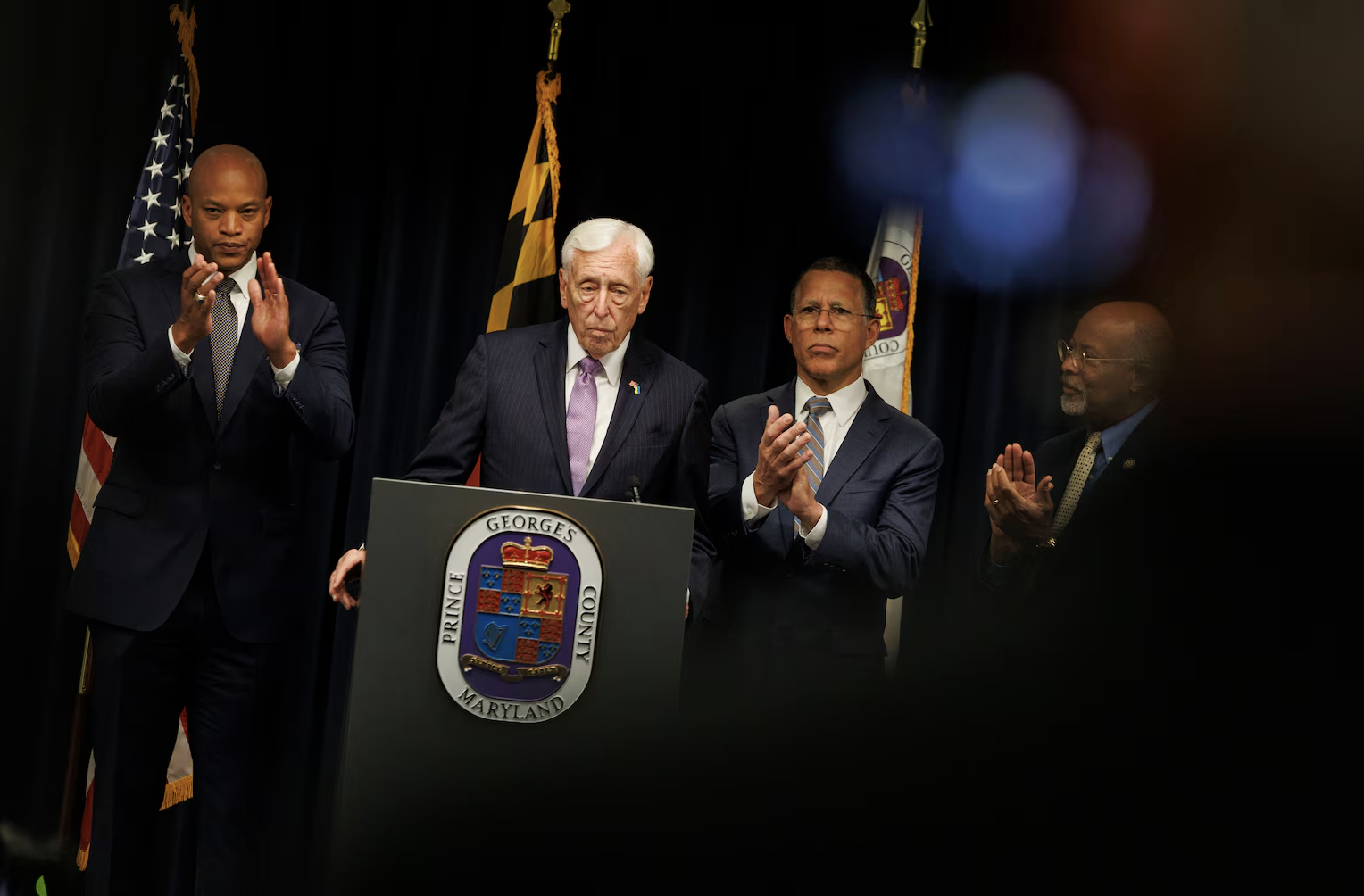
By ASSOCIATED PRESS and LISA MASCARO | Rep. Steny Hoyer of Maryland, the longest-serving Democrat in Congress and once a rival to become House speaker, will announce Thursday he is set to retire at the end of his term.
Hoyer, who served for years in party leadership and helped steer Democrats through some of their most significant legislative victories, is set to deliver a House floor speech about his decision, according to a person familiar with the situation and granted anonymity to discuss it.
“Tune in,” Hoyer said on social media. He confirmed his retirement plans in an interview with the Washington Post.
The rest of this article can be found on the Baltimore Banner’s website.
Maryland
Joseline Peña-Melnyk elected Md. House speaker
Family immigrated to New York City from the Dominican Republic
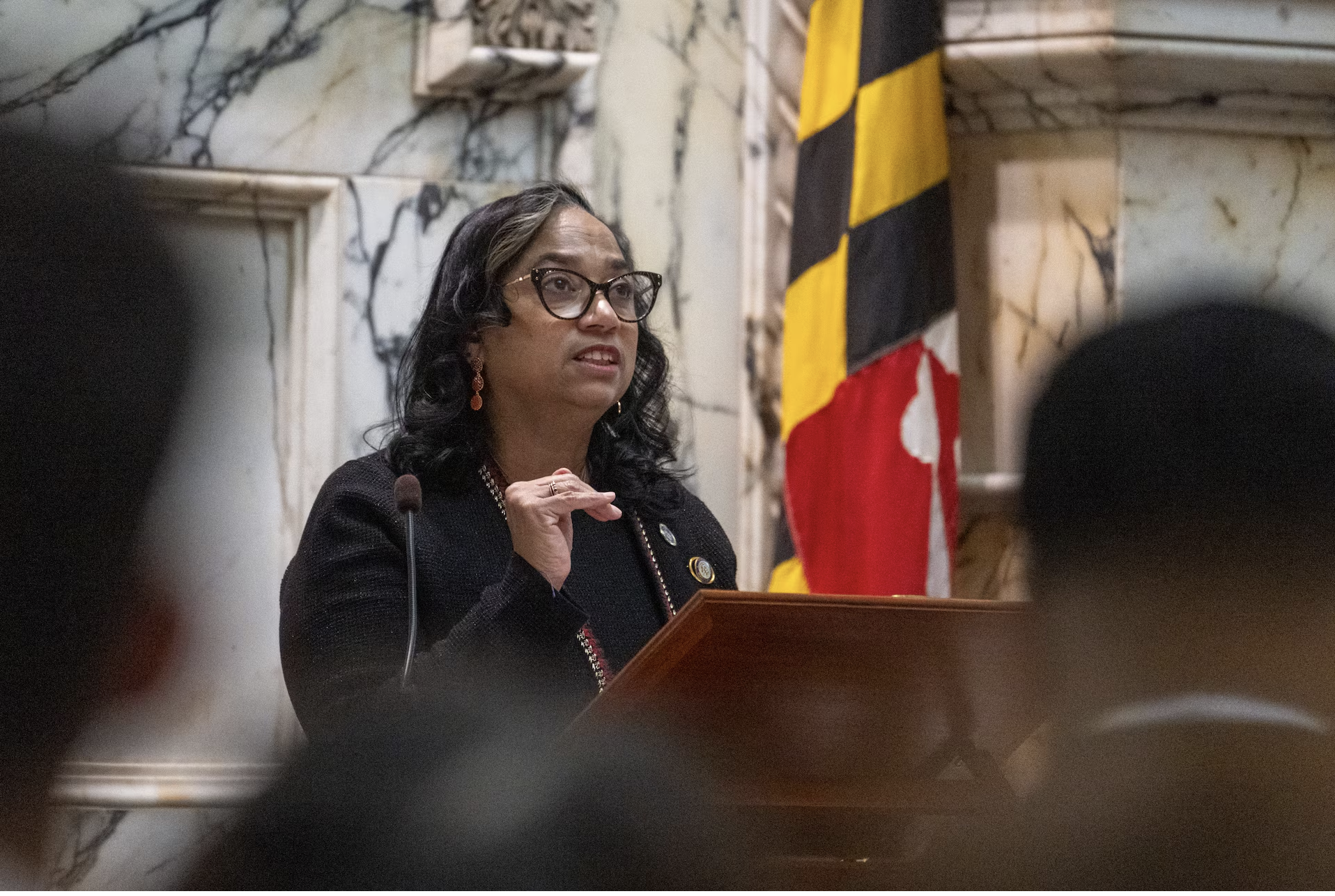
By PAMELA WOOD | Moments after being elected speaker of the Maryland House of Delegates Tuesday, state Del. Joseline Peña-Melnyk stood before the chamber and contemplated her unlikely journey to that moment.
Born in the Dominican Republic, the Peña family lived in a small wooden house with a leaky tin roof and no indoor plumbing. Some days, she said, there was no food to eat.
When she was 8 years old, the family immigrated to New York City, where Peña-Melnyk was dubbed “abogadito” or “little lawyer” for helping her mother and others by translating at social services offices.
The rest of this article can be read on the Baltimore Banner’s website.
Maryland
FreeState Justice launches 501(c)(4) group
FreeState Equality will focus on policy and advocacy
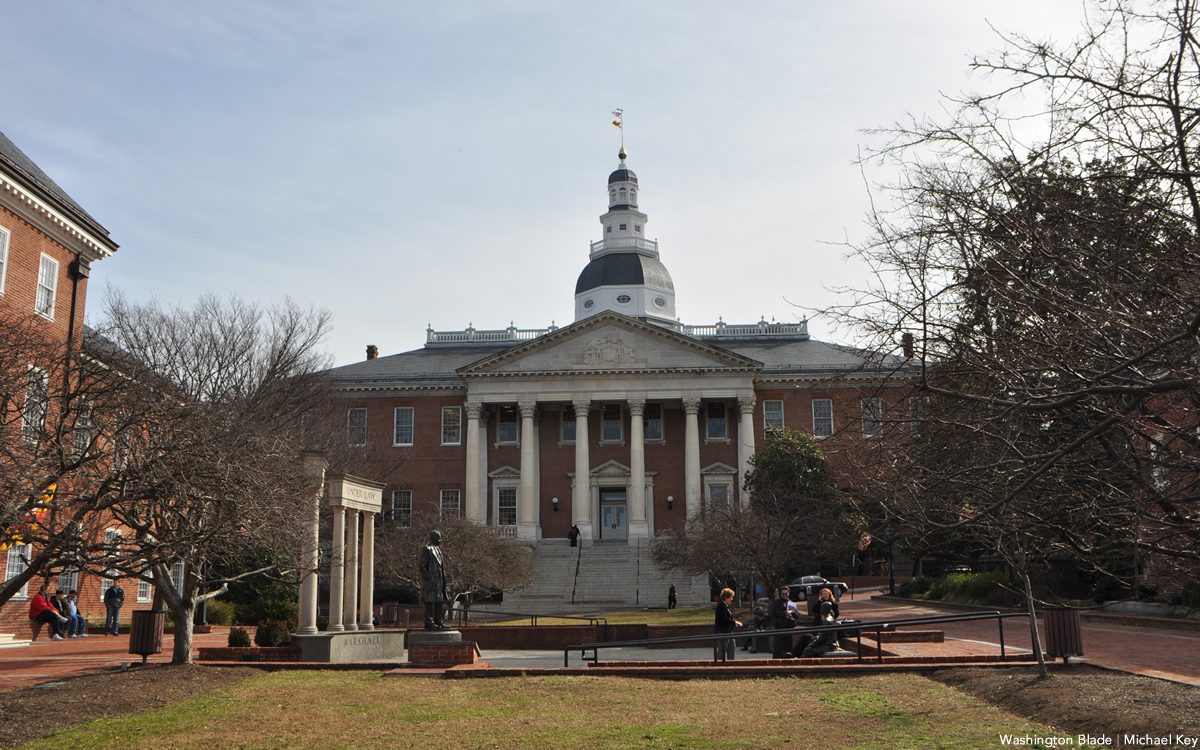
FreeState Justice, an LGBTQ organization that provides legal services, community programs, and public education in Maryland, announced the launch of FreeState Equality on Wednesday.
The new, independent organization intends to pursue advocacy and policy work beyond the legal capability of FreeState Justice, a 501(c)(3) non-profit. FreeState Equality functions as a 501(c)(4) organization, meaning it can partake in political activity.
“We are committed to transparency throughout this process and look forward to continuing our work together in service of LGBTQ+ Marylanders,” said FreeState Justice Executive Director Phillip Westry.
FreeState Equality will take on policy, advocacy, and civic engagement initiatives while FreeState Justice will pursue legal and direct-service work, according to Westry.
While both organizations adhere to similar values, they will feature separate leadership, operations and compliance.
FreeState Equality is hosting its first launch fundraiser on Dec. 10 at the Brass Tap in Baltimore. The event, held from 5-7 p.m., will feature insight from FreeState Equality staff about how Maryland policy can support the state’s LGBTQ community.
Attendees can purchase fundraiser tickets on Zeffy for $25 general admission, which includes a free first drink. The organization also welcomes additional donations.
-

 Sponsored5 days ago
Sponsored5 days agoSafer Ways to Pay for Online Performances and Queer Events
-

 District of Columbia4 days ago
District of Columbia4 days agoTwo pioneering gay journalists to speak at Thursday event
-

 Colombia4 days ago
Colombia4 days agoBlade travels to Colombia after U.S. forces seize Maduro in Venezuela
-

 a&e features4 days ago
a&e features4 days agoQueer highlights of the 2026 Critics Choice Awards: Aunt Gladys, that ‘Heated Rivalry’ shoutout and more

